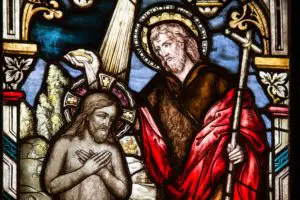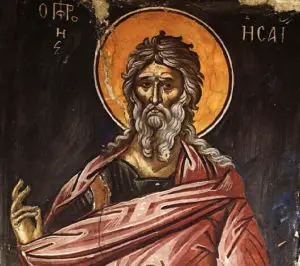Isaiah has been called the most significant prophet of the Old Testament. His writings are ”quoted more than twice as much as any other major prophet and more than all of the minor prophets combined.”[1] His extensive work is referenced directly or indirectly in 235 out of the 260 chapters in the New Testament.[2] More specifically, this “evangelical prophet,” as he is sometimes called, foretold more about the coming Messiah than any other Old Testament writer. It is vital, therefore, that we ask who did Isaiah understand the Messiah to be? How does his Christology compare with that of modern orthodoxy? To answer these important questions, this post will examine the first of what has been termed the Servant Songs, which are passages from Isaiah that refer to the coming Messiah as the servant of God.[3]
Who is the Messiah?
In the opening words of Isaiah 42, God introduces the coming savior as His servant:
Isaiah 42:1(NASB) “Behold, My Servant, whom I uphold; My chosen one in whom My soul delights. I have put My Spirit upon Him; He will bring forth justice to the nations. (emphasis added)
The Messiah is designated as God’s servant elsewhere in Isaiah, as well as in Zechariah.[4] That Jesus is the fulfillment of these servant of God prophecies is attested to in the New Testament. Matthew quotes from Isaiah 42 and says it has been fulfilled in Jesus.[5] In addition, the apostle Peter twice declared Jesus to be God’s servant in his sermon at the Gate Beautiful:
Acts 3:13 and 26 (NASB) “The God of Abraham, Isaac and Jacob, the God of our fathers, has glorified His servant Jesus, the one whom you delivered and disowned in the presence of Pilate, when he had decided to release Him…26 “For you first, God raised up His Servant and sent Him to bless you by turning every one of you from your wicked ways.” (emphasis added)
Jesus is not the “God of our fathers,” rather he is His servant.
After Peter was released by the Sanhedrin, he twice more acknowledged Jesus’ status, this time as the servant of God the Creator:
Acts 4:24 and 27-30 (NASB) And when they heard this, they lifted their voices to God with one accord and said, “O Lord, it is You who made the heaven and the earth and the sea, and all that is in them…”For truly in this city there were gathered together against Your holy servant Jesus, whom You anointed, both Herod and Pontius Pilate, along with the Gentiles and the peoples of Israel, 28 to do whatever Your hand and Your purpose predestined to occur. 29 “And now, Lord, take note of their threats, and grant that Your bond-servants may speak Your word with all confidence, 30 while You extend Your hand to heal, and signs and wonders take place through the name of Your holy servant Jesus.” (emphasis added)
What Does It Mean to be the Servant of God?
What does it mean to be the servant of God? The word servant in Hebrew is ebed and it means attendant, servant, slave. It comes from the word abad, which means to work, to serve.[6] Thus, a servant of God is one who does the bidding or work of God.
The Scripture records numerous people who were specifically called God’s servants.[7] Most notably, Abraham, Moses, David, and Isaiah:
Genesis 26:24 (NASB) The LORD appeared to him the same night and said, “I am the God of your father Abraham; Do not fear, for I am with you. I will bless you, and multiply your descendants, For the sake of My servant Abraham.” (emphasis added)
Numbers 12:7-8 (NASB) “Not so, with My servant Moses, He is faithful in all My household; 8 With him I speak mouth to mouth, Even openly, and not in dark sayings, And he beholds the form of the LORD. Why then were you not afraid to speak against My servant, against Moses?” (emphasis added)
Psalm 89:3, 20 (NASB) “I have made a covenant with My chosen; I have sworn to David My servant…20 “I have found David My servant; with My holy oil I have anointed him, (emphasis added)
Isaiah 20:3 (NASB) And the LORD said, “Even as My servant Isaiah has gone naked and barefoot three years as a sign and token against Egypt and Cush, (emphasis added)
In each case, the word servant is ebed in Hebrew, the same word used of the Messiah in the book of Isaiah.
To Serve is to Be Subordinate
Inherent in the meaning of the word servant is the idea that the servant is subordinate to the one he or she serves. To be subordinate means to rank below another; to occupy a lower class, rank, or position; inferior.[8] As God’s servant, Jesus is subordinate to God, occupying a position that is below or inferior to God. Indeed, Jesus acknowledged God’s superiority:[9]
John 14:28 (NASB) “You heard that I said to you, ‘I go away, and I will come to you.’ If you loved Me, you would have rejoiced because I go to the Father, for the Father is greater than I. (emphasis added)
What’s more, the man from Nazareth consistently demonstrated his inferior rank by always deferring to the Father’s will:
John 5:30 (NASB) “I can do nothing on My own initiative. As I hear, I judge; and My judgment is just, because I do not seek My own will, but the will of Him who sent Me. (emphasis added)
Luke 22:41-42 (NASB) And He withdrew from them about a stone’s throw, and He knelt down and began to pray, saying, “Father, if You are willing, remove this cup from Me; yet not My will, but Yours be done.” (emphasis added)

Some may counter that Jesus’ subordination to God was only temporary, citing Philippians 2:5-11, and claiming that Jesus emptied himself of his “godness” or divine nature only to take it back up again. However, the context of this passage is speaking about Jesus’ position or role, not a theorized god-nature. Even though Jesus was God’s chosen Messiah, he set aside the rights and privileges that the position afforded him and took on the role of an obedient bond-servant, even unto death. Paul is exhorting those in Philippi to have the same attitude, that of a bond-servant, toward one another.
Jesus’ subjection to God was not just a temporary role. As God’s chosen servant, Jesus will be subjected to God for eternity so that God, not Jesus, can be all in all:
1 Corinthians 15:22-28 (NASB) For as in Adam all die, so also in Christ all will be made alive. 23 But each in his own order: Christ the first fruits, after that those who are Christ’s at His coming, 24 then comes the end, when He [Jesus] hands over the kingdom to the God and Father, when He has abolished all rule and all authority and power. 25 For He [Jesus] must reign until He has put all His enemies under His feet. 26 The last enemy that will be abolished is death. 27 For HE [God] HAS PUT ALL THINGS IN SUBJECTION UNDER HIS FEET. But when He [God] says, “All things are put in subjection,” it is evident that He [God] is excepted who put all things in subjection to Him [Jesus]. 28 When all things are subjected to Him [Jesus], then the Son Himself also will be subjected to the One who subjected all things to Him, so that God may be all in all. (emphasis added)
When Jesus was exalted because of his obedience to do God’s will,[10] he was seated at the Father’s right hand, the place of delegated authority. Therefore, Jesus was and always will be under the Father’s authority.
God Was Pleased With His Servant
Surely, Jesus’ willingness to defer to the Father’s will, even unto death, is why God found such delight in His servant:
Isaiah 42:1a (NASB) “Behold, My Servant, whom I uphold; My chosen one in whom My soul delights.
When Matthew quotes this passage, in whom My soul delights is rendered as in whom My soul is well-pleased.[11] God publicly said at Jesus’ baptism and later when he was transfigured, that He was well-pleased with Jesus.[12] If Jesus is God, as modern orthodoxy claims, it is odd to think that God would announce that He was pleased with God. Could God do or be anything other than pleasing to God? A strange comment, indeed. But if Jesus is a man, as Scripture attests,[13] then it would be most fitting for God to announce that He was well-pleased with His obedient Messiah.
Chosen or Volunteered?
Some float the popular but unbiblical narrative that Jesus was the member of the Trinity that volunteered to come down from heaven to serve as a sacrifice for sins. But the Bible never says this. On the contrary, God said that He chose the Messiah, not that the Messiah volunteered:
Isaiah 42:1 (NASB) “Behold, My Servant, whom I uphold; My chosen one in whom My soul delights. I have put My Spirit upon Him; He will bring forth justice to the nations. (emphasis added)
The gospels confirm this truth:
Luke 9:35 (NASB) Then a voice came out of the cloud, saying, “This is My Son, My Chosen One; listen to Him!” (emphasis added)
Luke 23:35 (NASB) And the people stood by, looking on. And even the rulers were sneering at Him, saying, “He saved others; let Him save Himself if this is the Christ of God, His Chosen One.” (emphasis added)

By definition, to choose someone means to make a selection. God chose Jesus to be His servant just as He chose David, Moses, Aaron, and the nation of Israel:
Psalm 89:3 (NASB) “I have made a covenant with My chosen; I have sworn to David My servant (emphasis added)
Psalm 105:26 (NASB) He sent Moses His servant, And Aaron, whom He had chosen. (emphasis added)
Isaiah 44:2 (NASB) Thus says the LORD who made you and formed you from the womb, who will help you, ‘Do not fear, O Jacob My servant; And you Jeshurun [i.e. Israel] whom I have chosen. (emphasis added)
Jesus was chosen by God to, as one author puts it, do a task for God:
Jesus was to be Israel’s righteous remnant, a light to the Gentiles, and God’s Suffering Servant (Isa 49:6-7; cf. Matt 12:18). “The Messiah, like the nation [of Israel], was chosen to do a task” (Marston and Forster, God’s Strategy in Human History, 147).[14]
This is in effect what Jesus said when he prayed to the Father, whom he called the only true God:
John 17:1-4 (NASB) Jesus spoke these things; and lifting up His eyes to heaven, He said, “Father, the hour has come; glorify Your Son, that the Son may glorify You, 2 even as You gave Him authority over all flesh, that to all whom You have given Him, He may give eternal life. 3 “This is eternal life, that they may know You, the only true God, and Jesus Christ whom You have sent. 4 “I glorified You on the earth, having accomplished the work which You have given Me to do. (emphasis added)
Jesus of Nazareth was the servant of God, chosen to accomplish the work God had prepared for him to do.
What Differentiates Jesus From Other Servants of God?
Since servant of God is not a position that is unique to Jesus, what is it that sets him apart from other servants of God? Many would say it is because Jesus is God. They reinterpret the phrase servant of God to mean the God-servant or the God who serves when applied to Jesus. But we must be consistent in our interpretations of Scripture. Whatever it means for Abraham, Moses, David, and Isaiah to be servants of God, it must mean the same for Jesus. Whatever it means that they were chosen by God, it must mean the same for Jesus. We must not alter the meaning of words in an attempt to fit Scripture into a 4th century doctrinal mold that claims Jesus is both human and divine.
Instead of a theorized dual nature, what sets Jesus apart from other servants of God is the mission God gave him to accomplish. Isaiah provides us with a partial description of that mission here:
Isaiah 42:2-4, 6-7 (NASB) “He will not cry out or raise His voice, nor make His voice heard in the street. 3 “A bruised reed He will not break and a dimly burning wick He will not extinguish; He will faithfully bring forth justice. 4 “He will not be disheartened or crushed until He has established justice in the earth; and the coastlands will wait expectantly for His law.”…6 “I am the LORD, I have called You in righteousness, I will also hold You by the hand and watch over You, And I will appoint You as a covenant to the people, As a light to the nations, 7 To open blind eyes, To bring out prisoners from the dungeon And those who dwell in darkness from the prison. (emphasis added)
God chose Jesus to bring justice to the earth and to mediate a new covenant between God and man. Jesus is not the God who issued the covenant, but the human who was chosen by God to serve as its mediator:[15]
1 Timothy 2:5-6 (NASB) For there is one God, and one mediator also between God and men, the man Christ Jesus, 6 who gave Himself as a ransom for all, the testimony given at the proper time. (emphasis added)
How Would Jesus Accomplish God’s Will?
How did God say that the Messiah would establish justice in the earth, become a covenant to the people, a light to the nations, open blind eyes, and bring prisoners out of darkness?
Isaiah 42:1(NASB) “Behold, My Servant, whom I uphold; My chosen one in whom My soul delights. I have put My Spirit upon Him; He will bring forth justice to the nations. (emphasis added)

God’s servant would accomplish these things because he would be given God’s Spirit. Isaiah recorded a similar Messianic prophecy, which says in part:
Isaiah 61:1 (NASB) The Spirit of the Lord GOD is upon me, because the LORD has anointed me to bring good news to the afflicted; He has sent me to bind up the brokenhearted, to proclaim liberty to captives and freedom to prisoners (emphasis added)
Jesus read this prophecy about the coming Messiah to those in the synagogue in Nazareth and said that it had been fulfilled in their hearing.[16]
Elsewhere in Scripture, we are told that Jesus received the Spirit of God, that is, the Holy Spirit, at his water baptism,[17] and that he was full of the Holy Spirit.[18] Peter preached on the Day of Pentecost that God had anointed Jesus of Nazareth with the Holy Spirit and that God was with him.[19] These passages are all in keeping with God’s promise in Isaiah to uphold His servant:
Isaiah 42:1 (NASB) “Behold, My Servant, whom I uphold; My chosen one in whom My soul delights. I have put My Spirit upon Him; He will bring forth justice to the nations. (emphasis added)
The word uphold is tamak in Hebrew and it means to grasp, support, retain, hold up. We get a clear picture of its meaning in Exodus 17 when it is used to describe how Aaron and Hur held up Moses’ hands when he was too weary to do so himself.[20] It is also the word God used in Isaiah 41:10 when He said that He would “uphold” His servant Israel with His righteous right hand.[21]
If Jesus is God, he would not need to be upheld by God or empowered by His Spirit because he would inherently possess all power. But it was necessary for the very human Messiah to receive God’s Spirit and support in order to accomplish God’s messianic mission.
The Difference Between God and Messiah
The last aspect of Isaiah’s prophecy that we will examine concerns the clear distinction that God makes between Himself and His servant. God is the Creator who gives life to all, while the Messiah needs God to watch over him and hold his hand:
Isaiah 42:5-6 and 8-9 (NASB) Thus says God the LORD, Who created the heavens and stretched them out, Who spread out the earth and its offspring, Who gives breath to the people on it And spirit to those who walk in it. 6 “I am the LORD, I have called You in righteousness, I will also hold You by the hand and watch over You, And I will appoint You as a covenant to the people, As a light to the nations…8 “I am the LORD, that is My name; I will not give My glory to another, Nor My praise to graven images. 9 “Behold, the former things have come to pass, Now I declare new things; Before they spring forth I proclaim them to you.” (emphasis added)
Does God need God to watch over him and hold his hand? Assuredly not. But the Messiah needed God’s help and watchful eye as he carried out his mission.
Modern orthodoxy contradicts Isaiah’s prophecy because it declares that Jesus initiated the plan of salvation, volunteered for the cross, performed miracles, and accomplished redemption all because he is God. But no text of Scripture ever alters Isaiah’s prophecy so that it aligns with these post-Biblical beliefs. On the contrary, Isaiah’s Christology teaches us that Jesus is not the God who served, but the servant of God. For it is God who called, upheld, supported, watched over, and anointed Jesus.
God, who is clearly superior to His servant, Jesus, resolutely declares that He will not give His God-glory to another. And neither should we. There is but one God, the Father. Jesus is His faithful servant.
[1] James Flamming, The New Testament Use of Isaiah, Southwestern Journal of Theology Vol.11, Fall 1968, accessed 4-23-21, https://preachingsource.com/journal/the-new-testament-use-of-isaiah/
[2] David Sanford, Why Is Isaiah the Most Quoted Prophet in the Bible? accessed 4-23-21, https://www.christianity.com/wiki/bible/why-is-isaiah-the-most-quoted-prophet-in-the-bible.html
[3] Isaiah 42:1-9; 49:1-13; 50:4-11; 52:13 through 53:12.
[4] Isaiah 49:3; 49:6; 50:10; 52:13; 52:11; Zechariah 3:8.
[5] Matthew 12:17-21.
[6] ebed, NAS Exhaustive Concordance, https://biblehub.com/hebrew/5650.htm; abad, NAS Exhaustive Concordance, https://biblehub.com/hebrew/5647.htm
[7] In addition to Abraham, Moses, David, and Isaiah, the following were described as servants of God: Caleb in Numbers 14:24; Joshua in Joshua 24:29; Zerubbabel in Haggai 2:23; Samson in Judges 15:18; Hezekiah in 2 Chronicles 32:16; Job in Job 1:8. Others referred to themselves as God’s servant.
[8] Subordinate, Merriam-Webster Dictionary, https://www.merriam-webster.com/dictionary/subordinate
[9] See also John 10:29.
[10] Ephesians 1:17, 20-22; Philippians 2:9.
[11] See Matthew 12:18 NASB
[12] Matthew 3:17; 12:18; 17:5; 2 Peter 1:17
[13] John 8:40; Acts 2:22; 17:31; 1 Timothy 2:5.
[14] Jeremy Myers, Jesus is the Elect One, Redeeming God, accessed 5-18-21, https://redeeminggod.com/jesus-elect-one/
[15] See also Hebrews 8:6; 9:15; 12:24.
[16] Isaiah 61:1-3; Luke 4:18-21. See also Isaiah 11:1-5
[17] Matthew 3:16-17; Mark 1:9-11; Luke 3:21-22.
[18] Luke 4:1; John 3:34.
[19] Acts 10:38.
[20] Exodus 17:12.
[21] Isaiah 41:8, 10.





